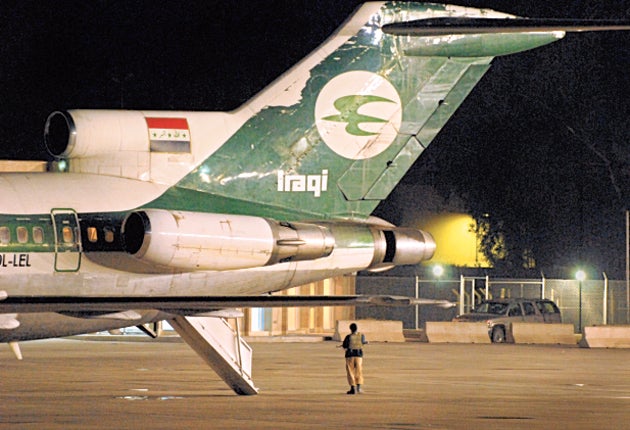National airline the latest victim of Iraq's poisoned relations with Kuwait

Your support helps us to tell the story
From reproductive rights to climate change to Big Tech, The Independent is on the ground when the story is developing. Whether it's investigating the financials of Elon Musk's pro-Trump PAC or producing our latest documentary, 'The A Word', which shines a light on the American women fighting for reproductive rights, we know how important it is to parse out the facts from the messaging.
At such a critical moment in US history, we need reporters on the ground. Your donation allows us to keep sending journalists to speak to both sides of the story.
The Independent is trusted by Americans across the entire political spectrum. And unlike many other quality news outlets, we choose not to lock Americans out of our reporting and analysis with paywalls. We believe quality journalism should be available to everyone, paid for by those who can afford it.
Your support makes all the difference.Iraq's government has dissolved its state airline Iraqi Airways in the latest move of a bitter dispute with Kuwait over war reparations allegedly owed since Saddam Hussein's invasion of the emirate in 1990.
Kuwait is demanding $1.2bn (£833m) in compensation for 10 planes and equipment taken by Iraq as plunder, in addition to $30bn in compensation already paid out of Iraq's oil revenues for damage suffered during the Iraqi occupation.
The decision to close down the airline was announced after a meeting between the Iraqi cabinet and its advisers. "Iraq's cabinet decided to close down Iraqi Airways and announced its bankruptcy," said Transportation Ministry spokesman Karim al-Tamimi.
The company, which has domestic as well as international flights to Tehran, Beirut, Dubai and other cities, will continue to operate until it is fully dismantled, though there was no announcement about when this will happen.
The bankruptcy was prompted by a disastrous attempt last month to start flights for the first time in 20 years between Baghdad and London. The maiden flight to Gatwick on 25 April turned into a nightmare for Iraq when the chief executive of the airline Kifah Hassan Jabbar had his passport seized and the chartered aircraft was impounded after papers were served by lawyers acting for Kuwait Airways.
In a statement published at the time, the lawyers said their actions were justified under a court order granted in 2004. The failed attempt to resume flights to London led to a protest demonstration by Iraqi Airways employees at Baghdad International Airport. Mr Jabbar only got his passport back and was able to return to Iraq when he complied with a court order to supply Kuwait Airways with a list of his company's assets in the UK.
The row highlights the legacy of hatred between Kuwait and Iraq stemming from the invasion of 1990, which saw mass looting by Iraqi forces.
This has not abated despite the overthrow of Saddam Hussein in 2003 and has been exacerbated by Kuwait's insistence that it should receive 5 per cent of Iraq's oil revenues despite Kuwait's per capita income of $41,000 being 10 times higher than Iraq's. Nationalists in the Kuwaiti parliament have denounced any proposed compromise. The debacle in London forced Iraqi Airways to cancel flights to the UK and Sweden. Baghdad International Airport is used by only a few international carriers and a number of charter flights to European capitals.
Iraq says that out of the 10 aircraft it took in 1990, four were destroyed by allied air strikes on Mosul airport in northern Iraq during the war in early 1991. The remaining six were flown to Iran for safety and later returned directly by the Iranians to Kuwait in 1992. Iraq's occupation of Kuwait was extraordinarily brutal and was accompanied by mass looting of everything from planes to frozen lobsters taken from luxury hotels in Kuwait City.
Iraq says it has repeatedly tried to resolve the row with Kuwait over the lost planes in a "friendly way" but has had no response. Hussein Shahristani, Iraq's Oil Minister, said earlier this month that the reparations are the highest paid by any country in history. "The sum of money that Germany paid to France and Britain [after the First World War] is less than Iraq has paid to Kuwait, even though that was a world war and the losses were considerable."
Join our commenting forum
Join thought-provoking conversations, follow other Independent readers and see their replies
Comments